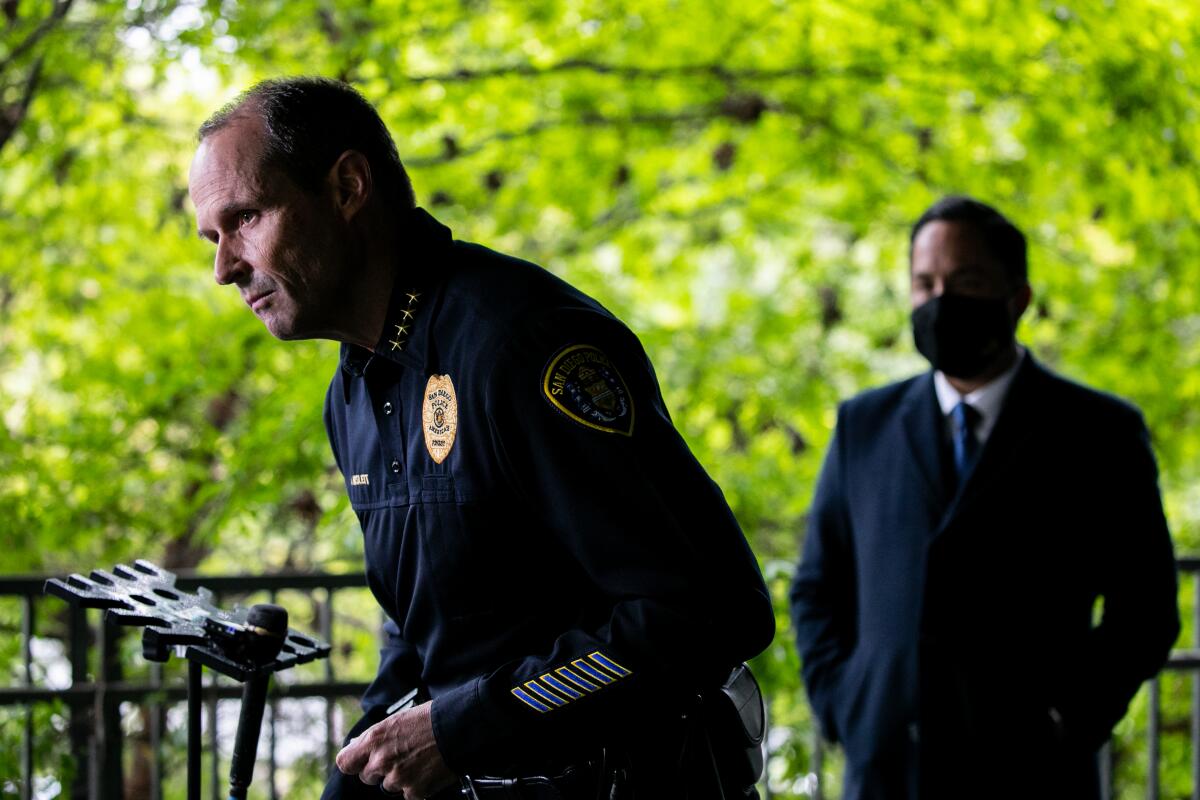San Diego police adopt new rules on interactions with transgender, nonbinary individuals

- Share via
SAN DIEGO — Police officers in San Diego must refer to transgender and nonbinary individuals by their pronouns, allow them to choose the gender of the officer who searches them, must take them to the jail facility that aligns with the person’s gender identity, according to a policy implemented Tuesday.
Police Chief David Nisleit said the new guidelines, developed in coordination with San Diego’s LGBTQ community and announced on the first day of Pride Month, “set clear expectations for interactions between [San Diego Police Department] officers and transgender and gender nonbinary community members.”
Under the new policy, officers must properly document a person’s gender identity in police reports, follow proper procedures for transporting individuals who identify as female — which includes recording the transport on body-worn cameras and notifying a dispatcher of beginning and ending mileage — and “make every reasonable attempt to recover medications for the individual.”
“Missing medications as part of an individual’s transition can be life-threatening,” the policy states.
“Historically, many members of our LGBTQ community — particularly those who identify as transgender or nonbinary — have not been recognized or respected for who they are. That changes with this procedure,” Mayor Todd Gloria — the first in that office to have come out as gay — said in a news release.
“This is a much-needed and welcome change that is symbolic of the respect we should have for one another and how we create a San Diego that is truly for all of us,” Gloria said.
Officer Christine Garcia, a traffic division investigator who transitioned from male to female in 2015, is the department’s transgender and LGBTQ liaison and acts as the direct link between those communities and the police chief. She said that while serving as a “straight man” before coming out, she sometimes heard “transphobic and homophobic remarks” from fellow officers.
After she came out, Garcia said, she believed that about half the department accepted her right away. A few more months passed, she said, and others came around to seeing that she was still a police officer “and just like any other normal human being.”
Garcia said San Diego police personnel received a training bulletin in 2014 dealing with interactions with the transgender community, but within the last year she recognized a need to formalize it.
“Since I am transgender myself, I took it upon myself to draw this up,” Garcia said, adding that she doesn’t expect any resistance to the new policy from officers. “But I don’t pretend to know everything about being transgender.”
The relationship between the LGBTQ community and police has sometimes been fraught. The 1969 Stonewall riots, often credited with helping spark the modern-day LGBTQ movement, started with police raids on a New York City gay bar. Last year, San Diego Pride said it would no longer give law enforcement agencies a contingent in the Pride Parade, held each year in July, or booths at the Pride Festival.
Michelle Dungan, who is a volunteer and the current secretary of Neutral Corner, which was founded in 1985 and is the oldest transgender organization in San Diego, saw no major issues with the new policy.
“The main idea with this, primarily, is to make sure a police interaction doesn’t become negative right from the start, and to prevent law enforcement from doing things that might push people’s buttons,” Dungan said.
Dungan, a retired environmental planner with Caltrans who transitioned in 1994, said another important aspect of standardizing the new policy is the ability for individuals “to seek ultimate rectification through the courts” if officers don’t follow the rules.
Courtney Skaggs, a La Mesa resident who is intersex and identifies as they/she, said the new guidelines “discourage assumptions and encourage self-determination.”
She added: “Encounters with police can be stressful and traumatic, and the fact that officers are mandated to respect pronouns and gender is important progress.”
But Skaggs questioned the new policy’s “lack of inclusion of intersex folks in key sections.”
Though the policy offers a definition of intersex as “a person who has both male and female sex organs,” and mandates that officers ask an intersex arrestee if they prefer being searched by a male or female officer, Skaggs was disappointed the policy didn’t mention intersex people in sections about bookings, use of pronouns and transportation.
Riggins writes for the San Diego Union-Tribune.
More to Read
Sign up for Essential California
The most important California stories and recommendations in your inbox every morning.
You may occasionally receive promotional content from the Los Angeles Times.










